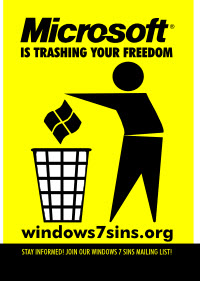Dissecting the FSF's "Windows 7 Sins"

Several Hardware 2.0 regulars have dropped me an email wondering what my take is on the Free Software Foundations "Windows 7 Sins" campaign.

But how valid are each of the seven "sins" outlined by the FSF, and how many are specific to Microsoft and Windows, and how many apply to commercial or proprietary software in general? Let's take a look at each sin in turn:
1. Poisoning education: Today, most children whose education involves computers are being taught to use one company's product: Microsoft's. Microsoft spends large sums on lobbyists and marketing to corrupt educational departments. An education using the power of computers should be a means to freedom and empowerment, not an avenue for one corporation to instill its monopoly.
A few years ago I might have agreed with the FSF on this one, but I don't think that it's valid any more. Increasingly schools are moving away from Microsoft operating systems and software. Unfortunately for the FSF, the move is towards Apple.
Taking a wider look at the issue, Microsoft isn't the only company offering students deep discounts on software packages in order to "encourage" them to become familiar with the software.
Verdict: No sin here ...
Next -->
2. Invading privacy: Microsoft uses software with backward names like Windows Genuine Advantage to inspect the contents of users' hard drives. The licensing agreement users are required to accept before using Windows warns that Microsoft claims the right to do this without warning.
While I don't like anti-piracy mechanisms such as WGA because they usually end up punishing the wrong people, to claim that Microsoft "inspect the contents of users' hard drives" is little more than FUD. Sure, mechanisms such as Windows Activation do pass on information relating to your system, it's of little or no value beyond creating a fingerprint to ID your system amongst a sea of other systems.
Verdict: No sin here ...
3. Monopoly behavior: Nearly every computer purchased has Windows pre-installed -- but not by choice. Microsoft dictates requirements to hardware vendors, who will not offer PCs without Windows installed on them, despite many people asking for them. Even computers available with other operating systems like GNU/Linux pre-installed often had Windows on them first.
This sin starts off strong by pointing out that every computer purchased has Windows pre-installed, but then deviates off into the realm of fantasy and conspiracy theories.
The reason why most PCs have Windows installed on them is down to OEMs and their price-cutting methods. Most OEMs while publicly supporting Linux privately worry about the costs and hassles of handling multiple operating systems. If people want Linux, they need to tell their OEMs.
Verdict: It's a valid point that most PCs have Windows pre-installed, but the sin is down to the OEMs.
4. Lock-in: Microsoft regularly attempts to force updates on its users, by removing support for older versions of Windows and Office, and by inflating hardware requirements. For many people, this means having to throw away working computers just because they don't meet the unnecessary requirements for the new Windows versions.
Lock-in is a valid point, but it's one that almost every commercial or proprietary software vendor is guilty of. The nature of commerce is that companies want you using their products or services over that of the other guy. If you don't like this, then go with FOSS.
Verdict: Sure it's a sin, but to single out Microsoft is disingenious to say the least.
Next -->
5. Abusing standards: Microsoft has attempted to block free standardization of document formats, because standards like OpenDocument Format would threaten the control they have now over users via proprietary Word formats. They have engaged in underhanded behavior, including bribing officials, in an attempt to stop such efforts.
This is an important issue, and there's no doubt that Microsoft worked hard to protect its document formats in favor of open formats, but in the end Microsoft lost the battle.
Verdict: Old argument rehashed ...
6. Enforcing Digital Restrictions Management (DRM): With Windows Media Player, Microsoft works in collusion with the big media companies to build restrictions on copying and playing media into their operating system. For example, at the request of NBC, Microsoft was able to prevent Windows users from recording television shows that they have the legal right to record.
Microsoft does drive DRM, but primarily for its own ends (such as for the Zune). While it's true that Microsoft does indeed build DRM into Windows Media Player, if it didn't, people looking to play back DRMed content would have to download a different player (such as is the case for those wanting to play Blu-ray on Windows). Windows is a platform, and for it to able to be a platform for some content, DRM is a necessary evil.
Verdict: If you don't like DRM, refuse to purchase DRMed content.
7. Threatening user security: Windows has a long history of security vulnerabilities, enabling the spread of viruses and allowing remote users to take over people's computers for use in spam-sending botnets. Because the software is secret, all users are dependent on Microsoft to fix these problems -- but Microsoft has its own security interests at heart, not those of its users.
All software has bugs. We have to rely on vendors for patches. And to protect systems from malware we rely on third-party security software. This whole "the software is secret" thing sounds like peddling FUD to me because I come across plenty of open source projects plagued by bugs.
Verdict: Moot point.
Bottom line
I'm really not all that impressed by the FSF's "Windows 7 Sins" campaign. Sure, it's doesn't pull punches, and it doesn't sugar coat some issues, but while some points are valid ad highlight potential problems with commercial or proprietary software in general, it's wrapped up in a lot of FUD and moon-howling.
Thoughts?
<< Home >>